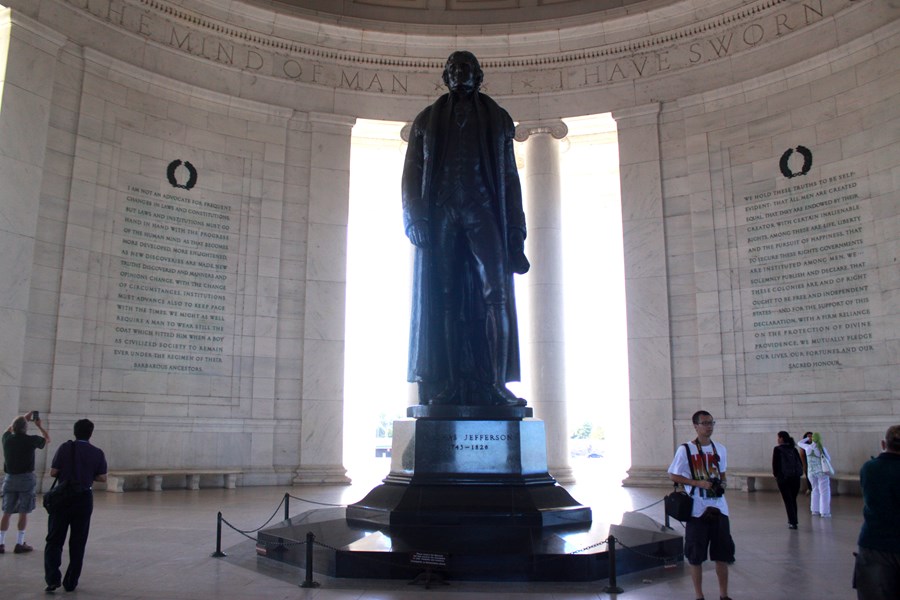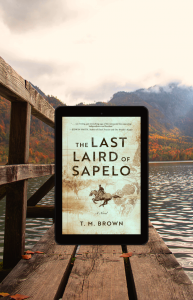
Would Our Nation Exist Today, If We Could Undo the Wrongs of Our Nation’s Past?
As the smoke clears from the celebrations of another Fourth of July. Beyond the hot dogs and hamburgers, we should never forget the price of liberty we enjoy in our Nation. Today, it is easy for many of us to look back on our Nation’s history and excoriate our founding fathers for their faults and shortcomings, but how must they be judged?
I highly recommend Lawrence Reed’s article on Thomas Jefferson. In recent months, an effort has grown to wipe Jefferson’s name from our history, but why? Should it be right and just to judge a man from the 18th Century by the laws and principals his very words and deeds fostered over the course of 250 years?
Would our Nation be celebrating its Independence if our 21st-Century conscience prevailed 250 years ago? We have overcome and continue to overcome the wrongs of our past, as viewed in the rearview mirror of history, but would our Nation exist if we could somehow wipe away all the wrongs?
I repeat, “we should never forget the price of liberty we enjoy in our Nation.”
It is this message that stirred me to write, The Last Laird of Sapelo, coming out on August 15th. I hope you’ll preorder a copy and then join me at one of my upcoming book talks. https://www.koehlerbooks.com/book/the-last-laird-of-sapelo/
Kudos to Lawrence Reed who likewise wrote the Foreword in my novel.
Read Larry’s article below: https://fee.org/articles/why-the-fourth-of-july-belongs-to-thomas-jefferson/
More than any other man or woman, July 4 belongs to Thomas Jefferson. As the principal author of the charter that proclaimed America’s independence and the reasons that impelled it, his spirit and his words are essentially what we celebrate on this day.
That such praise is not deemed “politically correct” in some quarters and may even evoke hostility in others is not a pleasant commentary on the state of current political dialogue. Isn’t it strange that evolution is accepted as natural in the biological world but often not in the realm of human thought?
A kind of intertemporal bigotry is loose in the land. It prompts the virtue-signaling self-righteous to judge people of the past against the conventions of today. Isn’t it strange that evolution is accepted (to one degree or another) as natural in the biological world but often not in the realm of human thought?
If two and a half centuries ago a man committed what was widely regarded as normal in the day but is now considered abhorrent, then no matter how much he may have done to hasten the wrong’s demise, to an intertemporal bigot he’s persona non grata at best. At worst, he’s a villain who must be denounced and flushed down the memory hole.
The Contradiction in the Slavery Debate
I refer, of course, to the apparent discrepancy in Jefferson’s public life (“All men are created equal”) and his private one (he was born into a slave-owning family and owned hundreds of slaves himself as an adult).
No one who loves liberty can countenance slavery, now or at any time in the past. That view is nearly universal today, but it wasn’t for much of human history. And humans didn’t support slavery one day and then oppose it when they all woke up the next. Some people never saw the light; others were against it from the moment it first entered their minds. Millions in the late 18th and early 19th centuries were somewhere in between, and lots of them evolved on the issue over the course of their lives. In other words, they learned and they changed. That’s how humanity progresses.
Thanks to visionaries like Jefferson, Americans were forced eventually to end the contradiction between the words of the Declaration of Independence and the reality around them. Jefferson’s own words were evoked to accomplish that.
Historian Jim Powell, in his FEE article of July 1, 1995, titled “Thomas Jefferson’s Sophisticated, Radical Vision of Liberty,” addressed the slavery issue thusly.
Though Jefferson had personal failings—in the case of slavery, a monstrous one—they don’t invalidate the philosophy of liberty he championed, any more than Einstein’s personal failings are evidence against his theory of relativity. Moreover, every one of Jefferson’s adversaries, past and present, had personal failings, which means that if ideas are to be dismissed because of an author’s failings, Jefferson and his adversaries would cancel each other out. When historians finish dumping on Jefferson, they still won’t have cleared the way for Karl Marx or whomever they admire. Jefferson’s accomplishments and philosophy of liberty must be recognized for their monumental importance.
So yes, Thomas Jefferson wasn’t perfect. And neither are his critics. They should hope that across their entire lives, they might accomplish for liberty what Jefferson achieved in a few weeks of literary genius. He marshaled the English language on behalf of ideas, and they sparked liberty’s loudest thunderclap in human history.
American Patriotism
Without a doubt, the words from Jefferson that the world knows best are these:
We hold these truths to be self-evident, that all men are created equal, that they are endowed by their Creator with certain unalienable rights, that among these are life, liberty, and the pursuit of happiness—that to secure these rights, governments are instituted among men, deriving their just powers from the consent of the governed; That whenever any Form of government becomes destructive of these ends, it is the right of the people to alter or to abolish it, and to institute new government, laying its foundation on such principles and organizing its powers in such form, as to them shall seem most likely to effect their safety and happiness.
What a magnificent statement, perhaps the most sublime ever penned for a noble cause! Revolutionary in their day, they will likely inspire for centuries to come, as they deservedly should. All but a few of the critics, meantime, will be forgotten.
I revere Thomas Jefferson, warts and all, and I’m proud to say so without apology. A bust of Jefferson, which I bought some years ago at Monticello, sits prominently on a pedestal in my living room. And it’s going to stay there. As I wrote in this 2003 essay, the ideals he expressed are what define American patriotism.
We all know him for the words in the immortal Declaration, but I offer here a sampling of Jefferson’s eloquence from other writings. They are among my favorites from his unmatched pen:
“A free people claim their rights as derived from the laws of nature, and not as the gift of their chief magistrate”
— A Summary View of the Rights of British America, 1774.
“The spirit of resistance to government is so valuable on certain occasions, that I wish it to be always kept alive. It will often be exercised when wrong, but better so than not to be exercised at all. I like a little rebellion now and then. It is like a storm in the atmosphere”
— Letter to Abigail Adams (22 February 1787).
“And what country can preserve its liberties if their rulers are not warned from time to time that their people preserve the spirit of resistance? Let them take arms. The remedy is to set them right as to facts, pardon and pacify them. What signify a few lives lost in a century or two? The tree of liberty must be refreshed from time to time with the blood of patriots and tyrants. It is its natural manure”
— Letter to William Stephens Smith (13 November 1787).
“I had rather be shut up in a very modest cottage with my books, my family and a few old friends, dining on simple bacon, and letting the world roll on as it liked, than to occupy the most splendid post, which any human power can give”
— Letter to Alexander Donald (7 February 1788).
“The legitimate powers of government extend to such acts only as are injurious to others. But it does me no injury for my neighbour to say there are twenty gods, or no god. It neither picks my pocket nor breaks my leg”
— Notes on the State of Virginia, 1781-83.
“Timid men prefer the calm of despotism to the tempestuous sea of liberty”
— Letter to Philip Mazzei (1796).
“A little patience, and we shall see the reign of witches pass over, their spells dissolve, and the people, recovering their true sight, restore their government to its true principles. It is true that in the meantime we are suffering deeply in spirit, and incurring the horrors of a war and long oppressions of enormous public debt. If the game runs sometimes against us at home we must have patience till luck turns, and then we shall have an opportunity of winning back the principles we have lost, for this is a game where principles are at stake”
— Letter to John Taylor (June 1798), after the passage of the Alien and Sedition Acts.
“I have sworn upon the altar of God eternal hostility against every form of tyranny over the mind of man”
— Letter to Dr. Benjamin Rush (23 September 1800), emblazoned within the Jefferson Memorial in Washington, DC.
“A wise and frugal Government, which shall restrain men from injuring one another, shall leave them otherwise free to regulate their own pursuits of industry and improvement, and shall not take from the mouth of labor the bread it has earned. This is the sum of good government”
– 1st Inaugural.
Now, go out and have a great and safe 4th of July. Do so with the knowledge that in significant measure, you are able to do just that because of a great but imperfect giant named Thomas Jefferson.

Lawrence W. Reed
Lawrence W. Reed is FEE’s President Emeritus, Humphreys Family Senior Fellow, and Ron Manners Global Ambassador for Liberty, having served for nearly 11 years as FEE’s president (2008-2019). He is author of the 2020 book, Was Jesus a Socialist? as well as Real Heroes: Incredible True Stories of Courage, Character, and Conviction and Excuse Me, Professor: Challenging the Myths of Progressivism. Follow on LinkedIn and Like his public figure page on Facebook. His website is www.lawrencewreed.com.
This article was originally published on FEE.org. Read the original article.
SUBSCRIBE to receive more timely articles related to T. M. Brown’s latest historical novel.
